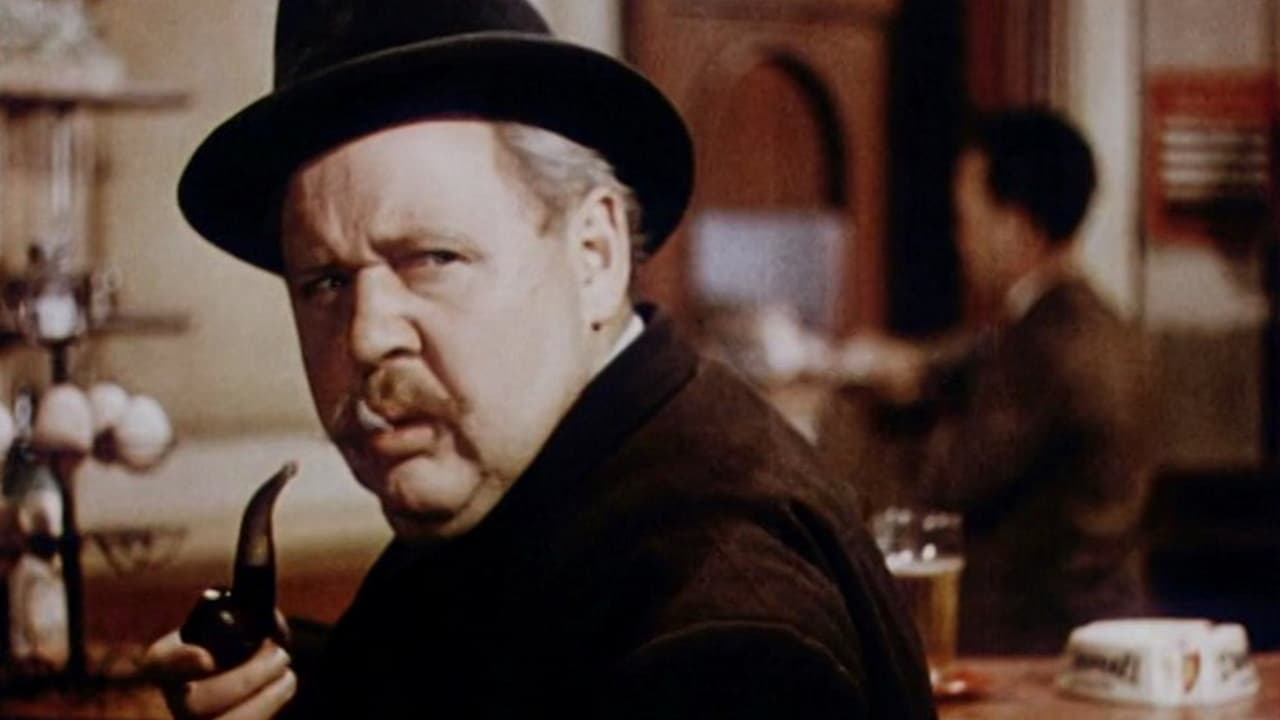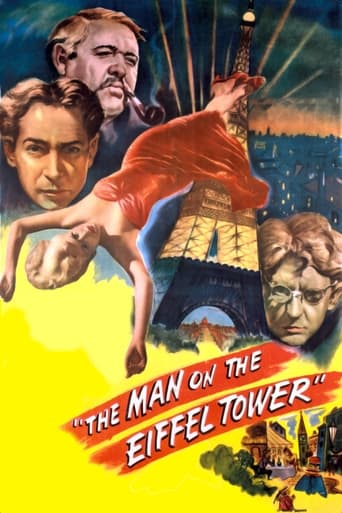

I think many reviews mistakenly treat the film as a complex who-done-it with the plot details confusingly handled and thoroughly patronise director Burgess Meredith without understanding the films true intention. The film is something quite different and perhaps unique.Franchot Tone (Radek)is really excellent as the manic ego-maniac murderer and here's the different and intriguing part - he doesn't try to keep a low profile and evade the investigating policeman, Maigret (Laughton also superb) but instead turns to continually hound him, dog his footsteps, is constantly at his side talking, discussing the case provoking and challenging him. Maigret must live with this intolerable situation in the hope that Radek will betray himself and that he (Maigret) will not betray his own thoughts or the current state of the investigation. Such is the odd relationship that they start to discuss the case as if Radek is a fellow detective. Laughton must keep the game going, keep satisfying Radek's vanity whilst listening, reasoning and trying to trap him.It concludes with a superb chase with something much more - psychological exchanges between Radek and Maigret as to what and where the final moments will be and who will witness them. Radek's wish to in a way triumph, Maigret's humanity in his desire to save the innocent not glory in the death of the guilty but that justice should be done, that he properly acquits himself of his professional duty - to keep his superiors off his back.The story is not I think not a portrayal of reality but a fantasy. It's detective's nightmare of an adversary who is not elusive and secretive but obvious and ever-present, taunting him, boastfully out-thinking him. In real life no murderer taunts the detective to this excruciating degree in effect exposes himself to questioning. I think it is the nightmare of a harassed detective might have when faced with contradictory and insufficient evidence and the sense that the truth and the criminal are tauntingly close but never ever quite close enough.A shame about the colour (some parts appearing like sepia) but these days it is fairly easily improvable. The film is a classic - probably if it had been in black and white it might be seen as suchSeen thanks to Talking Pictures TV
... View MoreYou'll go a long way to find a movie as ill-conceived and then ineptly shot as this remake of Le Tete d'un homme. In a case of let me count the ways you could start with the miscasting of Robert Hutton and Patricia Roc both of whom made their name playing respectively 'nice' guys and ingenues and here seen as manipulative husband and wife with Hutton sporting a ludicrous moustache and Roc as his American wife making no attempt at the accent. As Inspector Maigret Charles Laughton makes a great Inspector Clouseau without the laughs and ... but you get the picture. Hutton anticipates Farley Granger in Strangers On A Train by wishing his wife dead leaving him free to marry Jean Wallace though God knows why he would want to, while Franchot Tone, in the Robert Walker role, overhears and offers to do the deed for ready cash. Rounding off the bizarre casting is Burgess Meredith as the milquetoast knife-grinder framed for the murder. Three directors had a hand in this farrago; producer Irving Allen, quickly deep-sixed by Laughton who substituted first-timer Meredith and shot Meredith's scenes himself. The Ansco color shooting doesn't do it any favors and the DVD I have looks like a tenth generation print. It was actually shot on location in Paris but thanks to the print it may as well have been Upper Sandusky. One to give plenty or room.
... View MoreAs I started watching The Man On the Eiffel Tower it looked like it was going to go in the direction of Alfred Hitchcock's Strangers on a Train. Robert Hutton is having a sit down with his wife Patricia Roc and his mistress Jean Wallace in a Paris cafe. He gets an offer from Franchot Tone who was all ears that he'd kill Hutton's aunt who controls the family pursestrings so that Hutton could be independent. Tone doesn't lack for chops. He not only does the deed with a maid thrown in for good measure, he manages to pin the crime on milquetoast Burgess Meredith who just happened on the scene. Fortunately police inspector Maigret as played by Charles Laughton doesn't buy the pat scenario. He turns up Tone as a suspect, but he can't quite pin it on him. Tone's character reeks of Nietzchean superiority and France had just gotten liberated from a country that bought into that philosophy. Probably for today's audience, especially an American one, that particular dynamic can't be appreciated.Even an escape allowed by the Paris police by Meredith blows up in Laughton's face and threatens to ruin the career of Inspector Maigret. Fortunately Laughton has a few tricks up his sleeve.What we have in The Man On the Eiffel Tower is three very distinguished players from stage and screen who got together and made the film almost as a lark. Tone spent his entire film career trying to get out from under typecasting as a debonair gentleman in tails who usually loses the girl in the end to a bigger name. Right after this was done Franchot Tone did exactly that role in Frank Capra's Here Comes the Groom. His role here as Radek is certainly miles away from his usual parts. Tone produced this as he also produced another independent film the year before, Jigsaw, which was shot in New York.He got friend Burgess Meredith to direct and play the stooge. The story unfortunately does sag at times until the climax chase scene on the Eiffel Tower. That whole sequence is almost like The Third Man except where Harry Lime seeks escape in the sewers of Vienna, superman Tone leads his pursuers up the Eiffel Tower. In the end though he's not quite the superman he thinks he is.Charles Laughton made a nice Inspector Maigret. This is the second French police inspector of literature he's done. But there sure is a world of difference between Maigret and Javert of Les Miserables. In fact Laughton is far more like Sir Wilfred Robards in Witness for the Prosecution than Javert. It's too bad that director Meredith didn't have the kind of computer generated special effects and had to rely on brave stunt men and actors to do the job. If Man on the Eiffel Tower were filmed today, I'm sure it would have been far better. This criticism is almost a cliché, but Alfred Hitchcock could have really done something with The Man on the Eiffel Tower.
... View MoreThis is a really obtuse mystery film. I worried through the whole thing that Charles Laughton was going to pass out. The color is terrible (although I found it in a collection and didn't expect much). The story involves a plot to murder a woman, a frame-up, and a whole cast of characters who become involved in it. The murderer is pretty much known but Maigret (Laughton) must follow the whims of Franchot Tone as he plays with his mind. Laughton is patient and plays the game. Burgess Meredith, with blazing red hair, is the first living person victimized by the murderer and spends most of his time running away. His myopia is recreated in a "Twilight Zone" episode later, "Time Enough at Last." Where does everyone fit in? Are there really any good guys? I don't know. I do know it seemed like an eternity before the final dramatic scene (which is also a bit disappointing). It's interesting that the city of Paris is listed in the credits as one of the cast. Unfortunately, the color is so bad that this cast member really gets the short end of the stick.
... View More